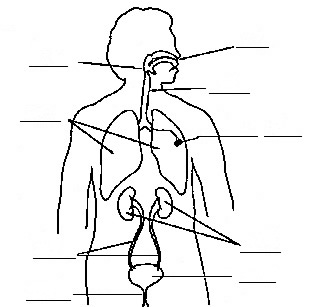Excretory system review key
Describe the excretory system.
Excretory system eliminates solid, liquid, and gas wastes necessary to sustain life. Undigested food is eliminated as solid waste through the intestinal tract small intestine and colon (see digestive system). Skin removes liquid and heat (see skin system). Lungs rid the body of heat and carbon dioxide, gas (see respiratory system). The urinary system remove liquids and solids (see excretory system) and endocrine removes solid and liquids (see endocrine system).
Describe functions of excretory system.
- The liver filters blood and removes toxins (ammonia, drugs, alcohol) and cellular products (bilirubin from breaking down red blood cells).
- The urinary system (kidneys, bladder, ureter, and urethra). filters wastes in the kidney and eliminates them and extra liquid from the body.
- Blood enters the kidneys where materials are filtered in the nephrons. The liquids and small materials: proteins, blood, amino acids, salt, and water pass through the walls and are routed back into the blood (reabsorbed).
- Kidneys balance the amounts of sodium, chloride, potassium, calcium, hydrogen, phosphate, and pH in the blood and ultimately the body.
- Wastes that do not pass through the nephrons walls (filtered) continue through the tubes and flow into a collecting duct that leads to the ureter where the waste is excreted as urine. Two ureters connect from the kidneys to the bladder.
- Bladder stores urine until you are ready to go to the bathroom.
- Urethra connects from the bladder to the outside of the body.
- Sphincters are circular muscles at the bottom of the bladder that keep urine in the bladder until a person urinates by the bladder muscles tightening and the sphincter muscles to relaxing causing urine to exit the bladder through the urethra.
Three substances that are found in urine.
Toxins, drugs, alcohol, ammonia, water, salt, bilirubin, urea
Parts and functions
Match the words in the word bank to the function and label the diagram.
- ___ kidney _______ organ that removes wastes from the blood.
- ___ urine ________ substance formed by water, urea, and salts in the kidney.
- ___ excretory _____ The body system that caries out the removal of body wastes.
- ___ perspiration ____ liquid waste removed by the body through the skin.
- ___ urethra _______ tube that connects from the bladder to the outside of the body.
- ___ blood ________ transports body wastes from the cells to the kidneys.
- ___ bladder _______ organ that collects urine before excretion.
- ___ ureter ________ duct that connects from the kidneys to the bladder.
- ___ liver _________ filters and processes blood as it circulates the body.
- ___ sphincters _____ circular muscles at the bottom of the bladder that keep urine in the bladder.
- ___ nephrons ______ filter the blood in the kidneys.
- ___ trachea _______ connects the larynx to the bronchial tubes.
- ___ carbon dioxide __ waste gas.
Label parts on the diagram

Word bank
esophagus, blood, nose, lungs, bladder, rectum, villi, gall bladder, nephrons, urine, ureter, kidney, sphincters, oxygen, carbon dioxide, respiratory, excretory, larynx, urethra, perspiration, bronchi
Describe ways to care for your excretory systems.
- Drink at least 64 ounces of water daily (8-8 ounces or 5 1/2-12 ounces).
- Limit use of caffeine, soft drinks, and alcohol
- Eat a balance diet. See also digestion and nutrition
- Practice good hygiene to reduce chance of infections
- Get regular medical check ups.
- Consult a medical professional of any changes in bowel or bladder habits: frequency, color, odor, pain ...
Describe health related care issues
- Jaundice (French, jaune means yellow) is caused by too much bilirubin (a substance that results from breaking down red blood cells) tints the skin and nails yellow. Jaundice in newborns needs to be monitored so if the bilirubin level gets too high (hyperbilirubinemia) it can be treated and lowered. If not it can cause brain damage (kernicterus) and other serious problems.
- Hepatitis is inflammation of the liver. Tissue can be temporally inflamed or permanently damaged. It can be caused by bacteria, parasites, viruses, metabolic problems, autoimmune, genetic, drugs, and other toxins.
- Cirrhosis is serious scarring of the liver caused by too much alcohol over a number of years. It can cause liver failure and death.
- Urinary problems usually cause inflammation of the bladder or urethra that is most often caused by bacterial infection. Symptoms can include pain, frequent urination, fever, blood in the urine. If not treated it can spread to the kidneys and cause kidney failure and death. Treatment requires medical advise and usually antibiotics.
- Nephritis is the inflammation of the nephrons . Can be caused by a bacterial infection, allergic reaction to medication, low potassium, long use of medication, and autoimmune disease. Symptoms include pain in the pelvic or kidney area, burning sensation when urinating, frequent need to urinate, cloudy urine, blood or pus in the urine, swelling of face, legs, and feet, vomiting, fever, and high blood pressure. Treatment requires doctor examination, antibiotics, medication, supplements, corticosteroids, dialysis, transplant.
- Kidney stones (salt crystals that harden into stone and block the passage of urine. Treatment with sound waves or surgery.
- Kidney failure is when the kidneys can not function and filter the blood which will result in death. Treatment can be dialysis. Dialysis uses a machine that filters the blood several hours two or four times a week depending on the person the size of the person and the seriousness of the problem. Kidney transplant.